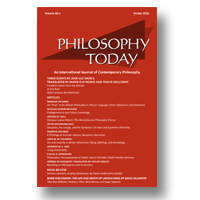|
61.
|
Philosophy Today:
Volume >
65 >
Issue: 1
Kadir Filiz, Claude Romano, Christina M. Gschwandtner
Phenomenology with Big-Hearted Reason:
A Conversation with Claude Romano
abstract |
view |
rights & permissions
| cited by
In this interview, Claude Romano discusses his phenomenological project of the event in relation to hermeneutics, reason, realism, and some other fundamental problems of phenomenology. He explains common themes in his phenomenological project and elucidates why he considers it important to leave behind the transcendental perspective in phenomenology. He distinguishes his descriptive realism from other realist movements in contemporary French philosophy. The interview also questions the Eurocentric orientation of many phenomenological authors and considers the possibility of going beyond such assumptions in phenomenology.
|
|
|
62.
|
Philosophy Today:
Volume >
65 >
Issue: 1
Pierre Hadot, Andrew Irvine
Epistrophe and Metanoia in the History of Philosophy
abstract |
view |
rights & permissions
| cited by
Crucial in Pierre Hadot’s account of ancient philosophy as a way of life is the phenomenon of conversion. Well before he encountered some of the decisive influences upon his understanding of philosophy, Hadot already understood ancient philosophy and its long legacy in later thinkers of the West as much more than a formal discourse. Philosophy is an experience, or at least the exploration and articulation of a potential for experience. The energy of this potential originates in a polar tension between epistrophe (return) and metanoia (rebirth). The two poles, which are grounded in primal experiences of the living organism, motivate and model the conversion which must be lived by the philosopher. The genius of Western philosophical experience lies in the effort to synthesize return and rebirth, and thereby recover the self as an ontological point of identification with and origin of the cosmos.
|
|
